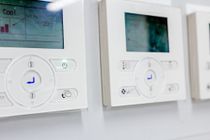
As the weather gets colder during winter, the air becomes drier as well. This makes a humidifier an even more important component of your HVAC system. The humidifier makes your home more comfortable by adding moisture to the air. Not only does it help your skin and eyes, but it also helps to reduce allergy symptoms.
Why Dry Air Is Rough on Allergies
Dry air can be difficult to deal with if you have allergies because it irritates your nasal passages. The dry air may cause your body to produce more mucus than is normally necessary, which is potentially dangerous if you have asthma and can even lead to a sinus infection. But dry air is rough on even those who don’t have allergies. Dry air can dry out your skin and irritate eczema, making the winter months especially uncomfortable.
Too Much Humidity Can Be Bad Too
 When an HVAC technician takes a look at your system, they will make sure to keep the humidity levels right where they need to be. That’s because too much humidity can also be an issue, and in fact it can be just as bad. A humid environment is one in which certain allergens like mold and dust mites can thrive. During an HVAC repair, a professional will look to strike the right balance in the air.
When an HVAC technician takes a look at your system, they will make sure to keep the humidity levels right where they need to be. That’s because too much humidity can also be an issue, and in fact it can be just as bad. A humid environment is one in which certain allergens like mold and dust mites can thrive. During an HVAC repair, a professional will look to strike the right balance in the air.
The right balance keeps your nasal passages clear of mucus, which helps you to purse away allergens. The ideal level of humidity for relief from allergy symptoms and minimal mold and dust mite growth is between 40 and 50%.
Bringing in a professional for HVAC repair will help make sure your humidifier is working properly and keep allergies at bay. If you need your system looked at, the experts at Ron Hammes Refrigeration provide reliable HVAC service to the La Crosse, Wisconsin, area. They also offer an extensive line of heating products. Give them a call today at (608) 788-3110 or visit their website to see their full list of services.
About the Business
Have a question? Ask the experts!
Send your question

